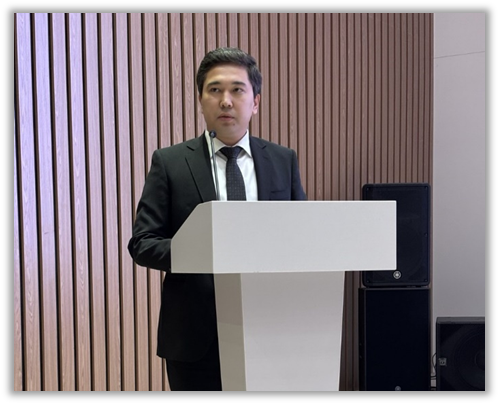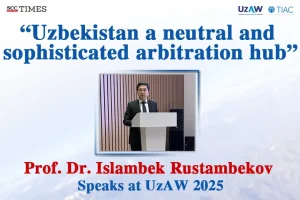The Chamber of Commerce and Industry of the Republic of Uzbekistan (‘CCI’) and the Tashkent International Arbitration Centre (‘TIAC’) have organized the 5th edition of the Uzbek Arbitration Week (‘UzAW’), i.e., UzAW 2025, which will take place from 23 to 26-09-2025 in Tashkent, Uzbekistan.
Kicking off the awaited conference, Ms. Diana Bayzakova, Director, TIAC, welcomed the various luminaries and invited Prof. Dr. Islambek Rustambekov, Acting Rector and Professor of Law at Tashkent State University of Law (‘TSUL’), Designated Member of Panel of Arbitrators of the ICSID from Uzbekistan, International Arbitrator, for the opening remarks.
Prof. Dr. Rustambekov began his address by expressing that, as someone who had witnessed the remarkable evolution of international arbitration, he was present at the occasion not merely as an academic or an arbitrator, but as a passionate advocate for the transformative power of alternative dispute resolution (‘ADR’) in our interconnected world.
He remarked that UzAW was a testament to Uzbekistan’s unwavering commitment to position itself at the forefront of international commercial arbitration. Furthermore, Uzbekistan’s strategic position in Central Asia uniquely qualified it to serve as a neutral and sophisticated arbitration hub where businesses from Europe, Asia, the Middle East, and beyond could find common ground. Uzbekistan is at the heart of a region experiencing unprecedented economic growth and cross-border investment.
“The adoption of the UNCITRAL Model Law on International Commercial Arbitration has not merely strengthened our legal infrastructure; it has fundamentally transformed our capacity to serve as a reliable and preferred seat for international arbitration.”

Regarding the conference, Prof. Dr. Rustambekov affirmed that UzAW was significant for the future architects of the profession, i.e., the law students, young practitioners, and emerging arbitrators, who will shape the landscape of international dispute resolution. For the academic community, it would provide an invaluable opportunity to bridge the gap between theoretical knowledge and practical application.
Furthermore, he highlighted that as the world stood at the threshold of a new era of dispute resolution, an era increasingly influenced by artificial intelligence and emerging technologies, the integration of AI in arbitration processes presented both unprecedented opportunities and complex challenges that demand our collective attention and wisdom. The current landscape of AI applications in arbitration, such as document review, case management, predictive analytics, and decision support systems, required careful consideration of fundamental questions. These questions were about transparency, disclosure obligations, maintaining the human element, etc, which touched the three pillars of arbitration, namely, foundational principles, due process, equality of treatment, and integrity of the arbitral process.
“The development of unified standards and best practices of AI application in arbitration is not just desirable, it is essential to maintaining public confidence in our dispute resolution mechanisms.”
For best practices, Prof. Dr. Rustambekov opined that Uzbekistan was a laboratory for developing best practices that will influence ADR development across Central Asia and beyond. UzAW will contribute to the global evolution of ADR. He also urged the attendees to envision the future that was being collectively built, an arbitration ecosystem where geographical boundaries do not limit access to justice, one where technology enhances rather than replaces human wisdom, and where the principles of fairness and efficiency are perfectly balanced.
Lastly, he encouraged the audience to engage in discussions, challenge conventional thinking, explore innovative solutions, and forge long-lasting connections, as this was an opportunity to participate in the continuing evolution of ADR as a cornerstone of international commerce and cooperation.

